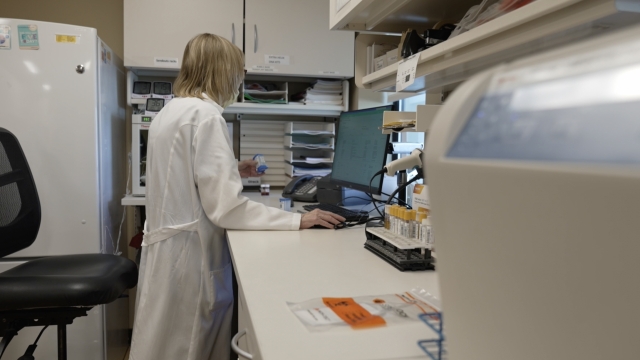Genetic testing to find DNA markers of genetic diseases, like cystic fibrosis and cancer, has been around since the 1960s and '70s.
But Johns Hopkins Medicine notes that just in the last decade, there's been an explosion of technology and knowledge.
That has helped to make tests more accessible. Now, genetic testing is playing a vital role in preventive health care.
Emma Pederson recently took a DNA health test called myGenetics because she didn't know about her family's medical history.
"I was born in Busan, South Korea, and I was eventually adopted to my family here in Minnesota," Pederson said. "And through that adoption process, closed adoptions were more common at the time, so I don't have hardly any information about my birth parents. And because of that, I also don't have any family health history."
Pederson knew the DNA test would search for markers of genetic diseases.
"Once I got my results, I was really relieved to find that I didn't test at a higher risk for any of the genetic markers," Pederson said.
If Pederson did have any of the markers, Leslie Dockan with health care company HealthPartners says, she'd be able to start preventive care.
"My sister-in-law had a genetic test early on and was told she had the BRCA one gene and that she was at higher risk for breast cancer," Dockan said. "So, she followed very closely with her physicians and they watched, you know, some changes in her breast tissue and other things. And then, she took preemptive steps and actually had a mastectomy before she developed her cancer."
HealthPartners is part of a network of hospitals using saliva and blood samples to help people identify what they could be at risk for.
"We look for BRCA one or two," Dockan said. "So breast cancer risk, we look for colorectal cancer risk, and then anyone with significantly elevated cholesterol, which drives early risk for cardiac disease."
They've partnered with Helix, a population genomics company that works with healthcare systems all over the United States. Elissa Levin is the vice president of medical affairs at Helix.
"About 8 or 9 out of every 10 people walking around have a risk for one of these conditions and don't know about it because our medical guidelines are just not catching all the people," Levin said.
Levin says the most exciting aspect about DNA is that it never changes.
"We can actually collect a person's sample once, we can sequence or read that information and securely store it like we're locking it in a safe vault," Levin said.
As science evolves and we can test for more diseases, Levin says that information will already be accessible. Dockan says it's also made it more affordable.
"Every time I have a question, I can just query the data. And that is very inexpensive compared to running another $3,000 test, another $5,000 test, another $10,000 test, because previously we didn't have a way to store that data and store it easily," Dockan said.
With more than 75,000 genetic tests on the market, Johns Hopkins Medicine says the expansion of DNA tests and improvement of technology has made testing cheaper. Right now, HealthPartners is offering the test for free if people agree to participate in research.
"Our goal is that we're building enough of a body of research to show how important genetics is to early identification, to being able to help prevent these diseases or catch them early in stage 1, that more and more people will join into this effort," Dockan said.
Dockan says we're at a turning point where our genetics can tell us which drug therapies will work for us and which medications will give us side effects. That's why she says it's important for people of all populations to participate in genetic testing.
Currently, she says people of color are underrepresented in genetic databases across the country.
"There's been a lot of historical trauma in the research field, and so there are people who are very hesitant to participate," Dockan said. "But by participating and knowing your own risk to support your family and your own health, you also are helping make sure that the new drugs and the new therapies are there and will actually work for everyone in all kinds of different backgrounds and races going forward."
This story was originally published on Scrippsnews.com




